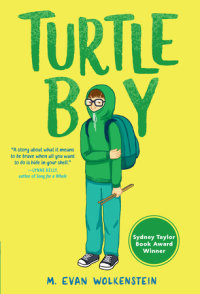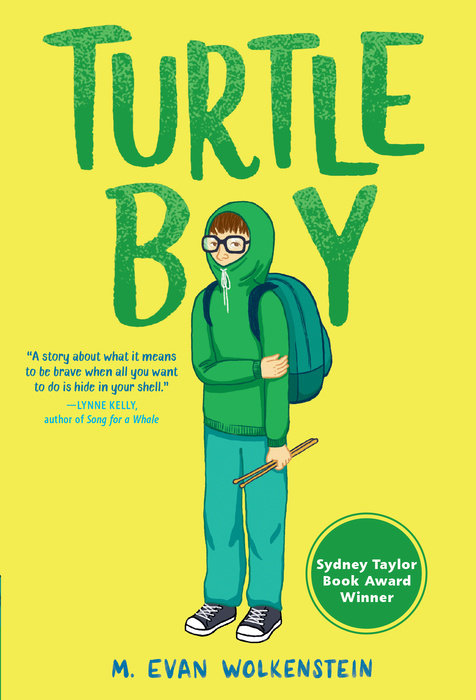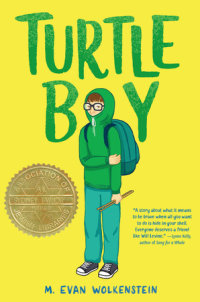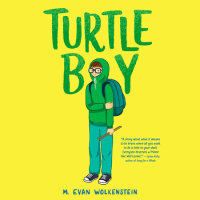Chapter 1
All that happened two years ago.
Now it’s the first day of seventh grade. Mom is driving me to school because I missed the bus.
“Is it possible you tried to miss the bus?” she asks, her eyes on the road. “Sometimes you’re late for things—you know, accidentally on purpose.”
Truthfully, it isn’t the bus’s fault. It’s my feet’s fault. Halfway to the bus stop, they froze. They would not move. I stood there, riveted, until the bus cruised past my stop, barely slowing down before gliding on its way.
I get these mini–panic attacks sometimes. Like at the start of summer, when I went to volunteer at a soup kitchen. Mom dropped me off outside an old church, and the receptionist pointed the way to the cafeteria. Halfway down the hall, I could hear the laughter of the other volunteers and kitchen staff. All I could think was What will they think when they see my chin?
My brain said Go, but my feet said Nope, no way.
I was at the soup kitchen because of Rabbi Harris. He…
Chapter 1
All that happened two years ago.
Now it’s the first day of seventh grade. Mom is driving me to school because I missed the bus.
“Is it possible you tried to miss the bus?” she asks, her eyes on the road. “Sometimes you’re late for things—you know, accidentally on purpose.”
Truthfully, it isn’t the bus’s fault. It’s my feet’s fault. Halfway to the bus stop, they froze. They would not move. I stood there, riveted, until the bus cruised past my stop, barely slowing down before gliding on its way.
I get these mini–panic attacks sometimes. Like at the start of summer, when I went to volunteer at a soup kitchen. Mom dropped me off outside an old church, and the receptionist pointed the way to the cafeteria. Halfway down the hall, I could hear the laughter of the other volunteers and kitchen staff. All I could think was What will they think when they see my chin?
My brain said Go, but my feet said Nope, no way.
I was at the soup kitchen because of Rabbi Harris. He was making all the kids who were starting the seventh-grade Hebrew school class do forty hours of community service—something to do with us having Bar and Bat Mitzvahs and becoming adults in the Jewish tradition, that we needed to take on responsibilities and give back to the community. The thing is, I didn’t want to do anything on the list. All the options involved meeting new people or going somewhere I’ve never been before, and I really, really like my routines.
We have a sheet of paper that an adult is supposed to sign each time we volunteer, and I totally could have forged the supervisor’s name—Mom wouldn’t have suspected anything—but I’m not like that. I’m not a liar.
Over dinner that night, I confessed that I’d hidden in the church parking lot for two hours instead of going into the cafeteria. Mom dropped her fork on her plate with a loud clank and went and got Rabbi Harris’s list.
“We’re going to find you a new place to volunteer,” she said. She went down the list of Rabbi Harris’s suggested volunteer opportunities: tutoring, senior home, community center, backyard or basement cleanup.
“No,” I responded after each one. “No, no, no.”
“Will!” she finally said, nearly shouting. She took a deep, exasperated breath. “You can’t go through life turning down every opportunity that comes along. You need to get out there and do something.”
“Why should I?” I asked back. “You never do anything.”
“We are not talking about me,” she said harshly. “We’re talking about your Bar Mitzvah responsibilities, which require you to do more than sit in your room all day taking care of your turtle collection.”
I resented the phrase “turtle collection,” but that’s pretty much what I did for the rest of the summer: I hung out in my room and read books and took care of my specimens. I have four kinds: a box turtle, a painted turtle, a musk turtle, and a small snapping turtle. I don’t know anyone else who loves turtles the way I do. I’d much rather be in my room, taking care of my turtles and their habitats, than doing anything else—with one notable exception: walking the trails of the Back 40.
The Back 40 is the nature preserve behind school. Some trails I’ve walked a hundred times. Some I’ve barely seen. In the Back 40, with the sun and the breeze, I can move freely, taking big steps and scanning the sky for soaring hawks, or I can inch along, searching the ground for herps. “Herps” is a nickname for reptiles and amphibians. It comes from the Latin “to creep.” I love looking for herps: toads and frogs and tiny garter snakes and especially turtles. In the Back 40, I’m alone but I’m never lonely.
When my science teacher, Ms. Kuper, first brought us out there in sixth grade, she explained that it was called the Back 40 because in the 1800s, farmers in Wisconsin used to be granted plots of land: forty acres in front of their homes, and forty in back. Our Back 40 isn’t forty acres, she explained, it’s more like four—and it was never part of a farm. It’s too marshy and full of cattails and trees. But that’s the nickname the Prairie Marsh School gave it when the county lent the land to the school a long time ago, Ms. Kuper said, when some of our grandparents were probably sitting in that very classroom.
My parents weren’t from Horicon: Dad grew up in California, and Mom grew up in Milwaukee. They met and got married in Berkeley. That’s where I was born. We only came to Wisconsin because my aunt Mo lives an hour from here, and after Dad died, Mom wanted to be closer to her sister.
At first, I hated Marsh Madness. That’s what Ms. Kuper called the class excursions into the Back 40. We were supposed to be looking at the flora and fauna. I only noticed the mosquitoes and mud. But then I realized that no one ever went out there after school. That meant it could all be mine.
I spent more and more time there, spotting red-winged blackbirds flying overhead, listening to the whoop of the whip-poor-will camouflaged in the trees. One by one, as spring turned into summer, I caught my turtle specimens. I didn’t tell anyone about it—not even Ms. Kuper. You could say that I secretly brought the Back 40 home with me and kept it in four large rectangles of glass in my room.
YYY
Mom and I drive in silence. There may be no way to escape going to school, but I’ve invented a way to keep people from seeing my face. I’ve started wearing an extra-extra-large hooded sweatshirt, even when the school is hot and stuffy, so I can draw the strings and close it around my face. Also, I fill my backpack with big books, partially so I have something to read when I eat lunch alone, but mostly so I can set up a wall in front of me.
On the bus, the front seat is mine. Nobody can turn and see my face except the driver. Last year, my best friend, Shirah, would get annoyed because her volleyball friends sat way in the back and she wanted to sit with them, but we had a deal: I copied her math homework and she copied my science homework. To do that, she had to sit in the front with me. We didn’t see it as cheating—we helped each other.
I hope we’ll continue that routine this year. I hope we’re over our rough patch. Back in third and fourth grades, Shirah used to come over every Saturday after synagogue, and we’d play hide-and-seek or we’d invent new snack recipes, like Nutella, Cheerios, and marshmallows, microwaved into a steaming blob.
In sixth grade we weren’t how we used to be. Shirah made the volleyball team and got a million new friends. Now we only hang out at Hebrew School and on the bus.
“You’re awful quiet,” Mom says. “Nervous?”
“No,” I say.
“Not even a little?” she asks, a hint of a smile in her voice.
I shake my head.
“Okay, so what are you feeling?” she asks.
“Nothing,” I say.
“Nothing at all?” she presses. When I don’t answer, she adds, “Will, I wish you’d talk to me. I want to be helpful.”
“If you want to be helpful, let me be homeschooled. You don’t even have to do anything, I’ll read my own books.”
Mom laughs, even though I’m not really joking.
We pull up to the curb outside school. “Have a great day, Will,” she says. “I think seventh grade is going to be much better than sixth.”
“I don’t,” I say, getting out of the car. “I think it’s going to be a living nightmare.” I slam the door.
“Beep!” she calls, leaning closer to the open window. “Will? Beep!”
This “beep” thing started a long time ago, just after Mom and I moved to Horicon from California. I hadn’t met Shirah yet, and Mom didn’t have any friends, so we would go to the budget theater on weekends—they showed reruns and oldies for five dollars. In one movie, a bunch of secret agents were synchronizing their watches before a mission. Mom and I started doing the same thing whenever we were going separate ways. She’d say “beep” and touch her watch and I’d answer “beep.” I loved it.
But that was when I was little. I think it’s totally stupid now. I don’t want to tell her that, though. I don’t want to hurt her feelings.
I muster a grumpy “beep” and turn toward the school. Once Mom drives away, I draw the strings on my hood and push through the school’s glass doors. The lobby and halls are empty.
This is bad. This is very, very bad. The receptionist sees me through her sliding window, standing there, frozen.
“Hello, young man,” she says, and points to the double doors. “Go in quietly; the assembly has started.”



